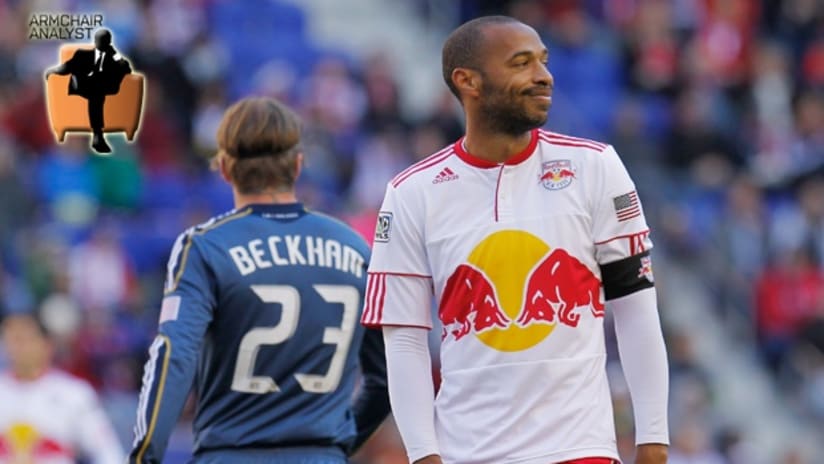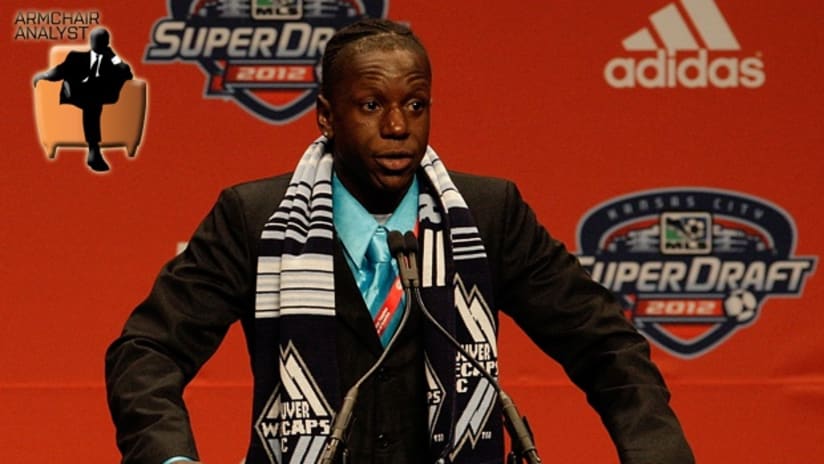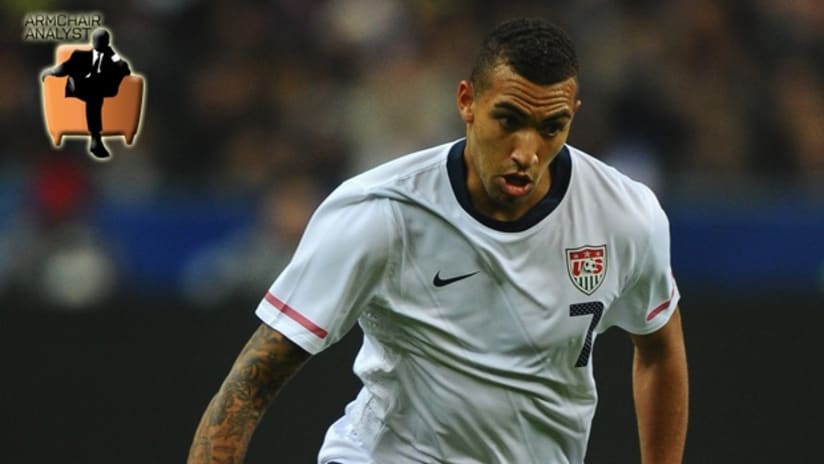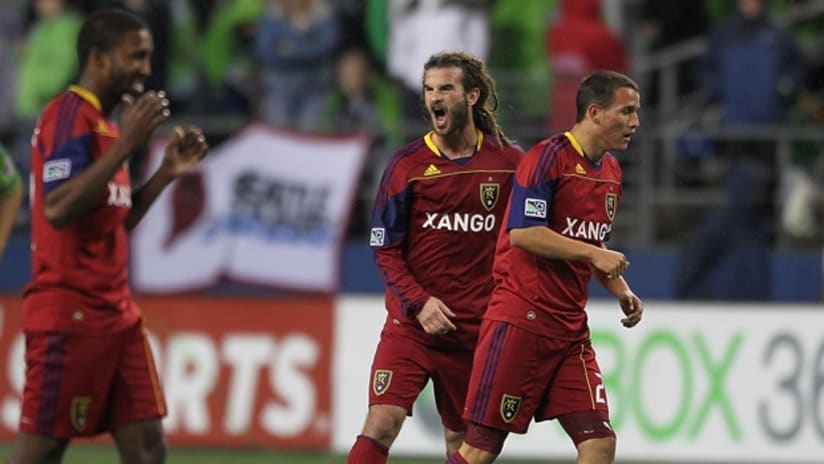It was a pretty bad weekend for the home teams in the first leg of the Conference Semifinals. The notable exception was Real Salt Lake, who dominated the Sounders on Saturday night to take a 3-0 lead into Seattle on Wednesday.
We’ll start there for some quickshot tactical analysis of what went right and what went wrong in each of the weekend’s contests:
Real Salt Lake 3, Seattle Sounders 0
The Opta numbers break it down pretty well, with RSL showing a clear advantage in total possession and completion percentage.
But the reasons behind those numbers are what tell the story. RSL were able to push Seattle into playing more vertically than the Sounders generally want to, forcing the back four into long-distance passing and generally neutralizing Osvaldo Alonso. Sigi Schmid said it was one of the worst games Alonso’s had in the defensive midfielder’s three years in MLS, and it’s hard to disagree.
While that made for a stretched and disorganized Seattle side that couldn’t string passes together until the last 15 minutes (at which point RSL began to play more conservatively in an effort to protect their 2-0 lead), it also created lanes for RSL to exploit when moving forward.
The positioning of Will Johnson in particular provided a dilemma for right back James Riley. Johnson stayed very deep on the night, leaving room in the left-center channel for playmaker Javier Morales to use (and use it he did – that’s where the first goal came from). Alonso frequently followed Morales with and without the ball, which left Riley to choose between pushing up and harassing the Canadian international, and thus vacating the flank for a counterattack, or staying back and letting Johnson act as a safety-valve when Real had possession.
It ended up being the latter more often than not, and Johnson’s ability to switch play and keep the ball moving is one of the underrated reasons his side bossed the game.
Philadelphia Union 1, Houston Dynamo 2
It seems unlikely Peter Nowak will trot out the five-man back line that played the first 45 minutes on Sunday. It also seems highly unlikely – or it should be, anyway – that he’ll go with the dual d-mid formation that’s been more hindrance than help for his team this year.
The choice to defend deep was a baffling one for several reasons, the biggest being that you’re almost certain to concede set pieces if you play that game. Against a team with Brad Davis whipping balls into Brian Ching, Andre Hainault, Bobby Boswell and Geoff Cameron, that’s suicide.
The 4-1-3-2 should be the order of the day. Figuring out who to play alongside (or just underneath) Sébastien Le Toux is the biggest decision, but it’s clear that the Frenchman should be used as a true No. 9, pushing the Dynamo back four.
Defensively, the Union have two mandates: Stop giving up set pieces and stop giving Davis chances to cross the ball. The midfielder had 10 on the day, and Philly were lucky only one turned into a goal.
On the Houston side, it couldn’t have gone much better, with the one blemish being Cameron’s ill-advised, poorly timed challenge that freed Justin Mapp up to start the sequence leading to the first goal. Otherwise, Cory Ashe did a very good job of staying wide to neutralize Sheannon Williams on the overlap, while Hainault and Danny Cruz did well to take the space down the right side, largely eliminating Gabe Farfan’s overlapping threat.
New York Red Bulls 0, LA Galaxy 1
Over the past several years, one of the more reliable predictors of playoff success is choosing whichever team has played fewer games to advance. Teams with extended US Open Cup or CONCACAF Champions League runs simply haven’t had the legs to compete come the postseason.
That fed into LA’s plan in New York, a game in which they pressed for the first 30 minutes then spend the rest of the game conserving energy while looking for a counterattack. Obviously the pressure paid off – Mike Magee’s 18th-minute goal came at a point in the game when the Galaxy had RBNY scrambling to put out fires all over the pitch – and the decision to counter would have paid as well, had Robbie Keane or Landon Donovan been able to finish open chances in the box.
LA will take the 1-0, of course, but Hans Backe and RBNY have some serious decisions to make. The Galaxy were able to neutralize Thierry Henry by leaving Juninho deep (a role likely given to Chris Birchall for the second leg since the Brazilian is suspended), putting the Frenchman in a situation where, when he received the ball, he was almost always moving away from his own net. As it turns out, Henry’s best pass of the night was a blind, overhead kick into space for Luke Rodgers. Not exactly textbook attacking soccer, that.
Colorado Rapids 0, Sporting KC 2
The Rapids were spent by September and have been holding on by a thread. Factor in the injuries they suffered, the red card, and Sporting’s young legs and good health, and the 2-0 result was probably, in retrospect, predictable.
It actually obscures the fact that Colorado played fairly well through the first 45 minutes, giving few chances to counter and daring KC to beat them by stringing together passes in the attacking zone. On the few times Sporting attempted the latter, Jeff Larentowicz was usually there to clean up the threat.
Of course, it was a turnover and counterattack that gave Sporting the lead just a few minutes into the second half. So the good form didn’t last nearly long enough.
The real problem, though, occurred when Graham Zusi stepped into the red zone just between the defense and midfield. It’s well understood by now that anything within 30 yards means Zusi can have a rip on goal, so when Larentowicz stepped up to snuff out that option, it gave the enganche the lane to slip Teal Bunbury through and draw a red card on Tyrone Marshall.
In other words, Colorado made the right play; Zusi simply made a better one.
Matthew Doyle writes the Armchair Analyst column for MLSsoccer.com.





